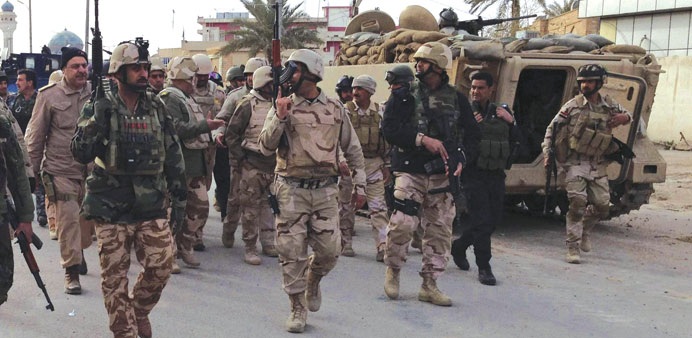Reuters/Baghdad
The Iraqi army intensified its shelling of Fallujah yesterday in preparation for a ground assault to regain control of the city, which has been under the control of militants for a month.
Sunni Muslim anti-government fighters, among them insurgents linked to Al Qaeda, overran Fallujah in the western province of Anbar on January 1, against a backdrop of deteriorating security across Iraq.
Prime Minister Nuri al-Maliki, whose Shia-led government many in the Sunni minority accuse of discrimination, had held off an all-out offensive to give local tribesmen a chance to expel the militants themselves.
But security officials said on Saturday that a decision had been made to enter Fallujah yesterday.
“Orders have been issued to start shelling the city with artillery and planes to detect the potential abilities of militants inside Fallujah and try to find a gap to get into the city,” a top security official said yesterday.
“Troops and tribal fighters are stationed in their positions just 15 minutes outside Fallujah.”
The official said militants had planted roadside bombs along the main roads into the city, and the army would use different routes to enter.
Earlier yesterday, security officials said Maliki had received phone calls from the ambassadors of several countries in the region urging him not to storm the city, but preparations were going ahead nonetheless.
“We have finished all our preparations and are waiting for the final say, which must come from Maliki himself,” said a senior military commander.
Maliki has appealed for international support and weapons to fight Al Qaeda, although critics say his own policies towards Iraq’s once-dominant Sunni community are at least partly to blame for reviving an insurgency that had climaxed in 2006-07.
Last year was the bloodiest since 2008, according to the UN, and the violence monitoring group Iraq Body Count says more than 1,000 people were killed in January.
A further 13 people were killed in attacks across Iraq yesterday, and police said they had found the bodies of three Shia farmers with gunshot wounds to the head and chest.
Shias are often attacked by Sunni insurgents including the Al Qaeda-affiliated Islamic State of Iraq and the Levant (ISIL), which has been gathering momentum over the past year, particularly in Anbar, which shares a border with war-torn Syria. Maliki blames the upsurge in militancy in Iraq on the conflict next door.
ISIL’s resurgence has divided Sunnis in Anbar, many of whom share its hatred of the Shia-led government but deplore its violent tactics. Others sympathise with and support ISIL or are too fearful to stand against it.
The government issued an amnesty last week to clear the criminal records of hundreds of Sunnis after they agreed to side with the government against ISIL.
Officials said they did not expect the battle for Fallujah to last more than a few days if they faced resistance only from ISIL militants, whose number they estimated at around 300.
“If the other armed factions rashly decide to fight, then the battle will last for more than two or three weeks,” said the military commander.

Iraqi soldiers deploy on the outskirts of Anbar province yesterday.
